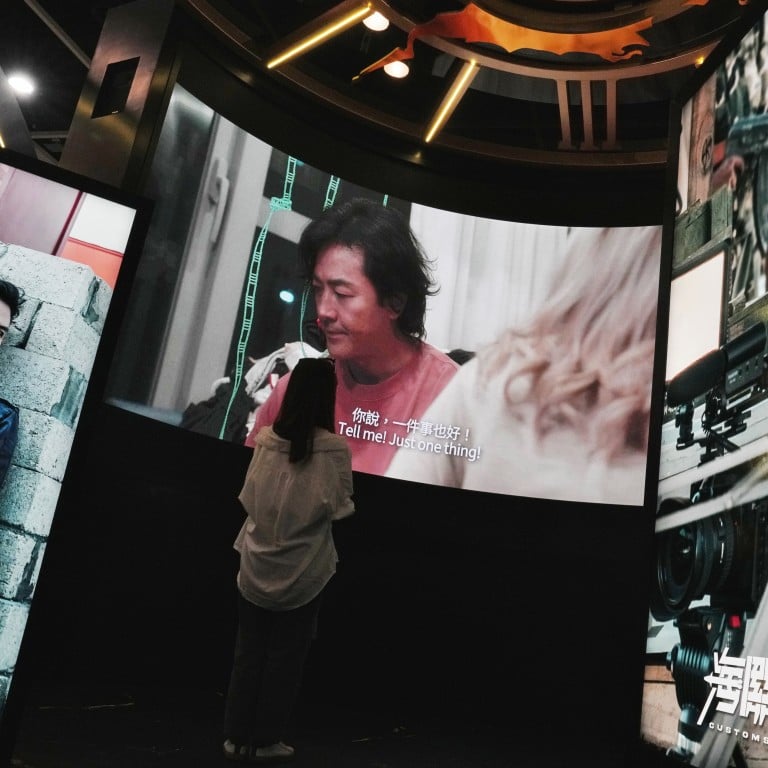
60% of Hong Kong film and TV workers experienced salary delays, university survey finds
- Lingnan University research team says most of the film and TV industry workers face fragmented employment patterns, which make it difficult for them to seek fairer treatment
- ‘We believe that the government should take the lead in urging the industry to introduce standard contracts, promote the culture of signing a full agreement before starting work,’ it adds
The Lingnan University research team on Tuesday called on the government, a major industry investor, to take the lead in promoting reasonable working conditions, including hiring employees under standard contracts, in their funded projects.
“Most of the film and television workers face fragmented employment patterns, making it difficult for them to seek improvements in their treatment,” Professor Pun Ngai, head of the university’s department of cultural studies, said.
“We believe that the government should take the lead in urging the industry to introduce standard contracts, promote the culture of signing a full agreement before starting work and address the occupational safety and health risks during the production period to safeguard the freelance workers’ interests.”

Between April 2023 and January 2024, the university surveyed 212 respondents aged between 18 and 65 working in film, television, advertising and online video production, and conducted interviews with 44 of them.
About 70 per cent of the respondents were freelancers and 20 per cent were directly employed, while the rest were either part-timers or hired through production houses.
Most work agreements in the industry were informal, as less than 25 per cent of them signed formal contracts. The rest worked based on verbal or message agreements or had no contracts at all.
More than half of them made less than HK$20,000 (US$2,555) a month on average over the past six months, lower than the median income in the city.
Oscar-winning star Ke Huy Quan says Hong Kong film industry helped inspire him
The survey found that more than 60 per cent of respondents experienced delays in pay in their most recent jobs.
Among them were about 20 per cent who saw their wages delayed for six months or more and another 20 per cent for one to three months.
Camera crews, lighting technicians and electricians were found to have suffered the most frequent wage delays.
But only half of the respondents succeeded in pursuing wage claims, the rest either failed to recover the salaries or were still in the process.
Those who remained silent said they were worried about being badmouthed or thought making complaints would be time-consuming and complicate the situation.
During interviews, respondents often said the “industry is just the way it is”, as they were concerned challenging the rules would harm their reputation and cause them to lose future job opportunities.

A cinematographer and post-production editor identified as Stark told researchers that it once took him 2½ years and a threat of legal action before getting paid.
His contract stated that he would be paid upon the delivery of the film, but he only received evasive or no replies at all when he inquired about it. The client also requested changes every few months to show the video was not a “finished product”.
Meanwhile, the occupational safety of the workers was unprotected in the industry, with less than 10 per cent saying that they would always and frequently discuss work-related injury arrangements and insurance with their employers.
The industry was also plagued by long working hours, as most respondents said they spent at least 12 hours shooting, in addition to preparation and administrative work.
Pun urged the government to consider regulating the film and television industry by measures like requiring high-risk filming projects to be reported to the Labour Department before starting work on shooting sites.
Labour-friendly measures could also be promoted by introducing terms on standard contracts, work schedules and working hours when subsidising production projects, he added.
Alibaba media arm to invest HK$5 billion in Hong Kong’s film, culture sectors
Federation of Hong Kong Filmmakers spokesman Tenky Tin Kai-man rejected the allegation that delays in salary payments were a widespread problem in the film and TV sector.
He added that late payments were almost unheard of for big or established companies, although smaller companies might not have the same record.
“Occasionally, some smaller production houses or independent producers might have problems paying some crew members on time because of their own cash flow difficulties,” Tin said. “And our federation would step in to help mediate or chase back the money for the affected crew members.”
Tin, also a veteran actor and production manager, added the proposal for a “standard contract” was impractical, because there were different types of crew members looking after a variety of aspects of productions.
Tin estimated that there were about 4,000 people active in the film industry, including film stars, directors, and technicians, at present.
Financial Secretary Paul Chan Mo-po announced in February’s budget that the government would inject about HK$1.4 billion into the Film Development Fund in 2024-25 to support film projects and boost the city’s creative industries.
Tin said the cash was a shot in the arm and could allow more city filmmakers to produce high budget movies and establish overseas market.


